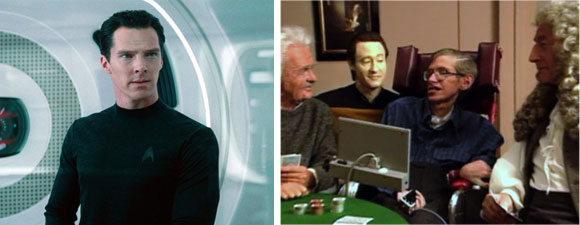New Star Trek Into Darkness Revelations
3 min read
Several of the Star Trek actors spoke recently to MTV about Star Trek Into Darkness, and in the interviews, they revealed a bit more about Benedict Cumberbatch‘s character, the peril of the Enterprise crew and Kirk’s interaction with Alice Eve‘s character.
As usual, potential spoilers are behind the cut.
Cumberbatch’s revelation of details about his character, John Harrison, gives more insight into Harrison’s motivations and powers. “[Harrison]’s a terrorist,” he said. “He operates as a terrorist. He has extraordinary physical powers, but also mental powers. He can sow an idea, which is as powerful as gunshots or close-hand combat, which he’s masterful in. He tears into the fabric of both the world and the Enterprise family, and he leaves behind him a trail of devastation. It’s quite exciting to watch.”
Harrison is bent on vengeance of some sort, and Cumberbatch explained a bit about Harrison’s reasons for that vengeance, but tried to do so without giving away too much information. “Giving away the full motivation would ruin it,” he said; “but it’s personal. It’s also political, I think. He’s somebody who, at some point in the film, you should feel a certain amount of empathy towards his cause, if not his means. There’s no two-dimensional obstacle he presents purely and simply by the fact that he’s opposing our hero.”
Opposing our hero means using his crewmates against him whenever possible. “[Harrison] has an interesting relationship with Kirk, and with Spock in a way,” explained Cumberbatch. “He very much plays them off against each other. There’s an element of shadow to him and Kirk.”
Get More:
Movie Trailers, Movies Blog
Meanwhile, Zachary Quinto warned fans not to be complacent about the fates of Kirk or Spock in Star Trek into Darkness. “There is reason to worry. The enemy that we face in this movie…is entirely different than enemies that we’ve seen this crew face in the past. There’s an insidiousness, and a ruthlessness and a fierce intelligence to his character that almost infiltrates and undermines the connectivity of the crew to a degree that the stakes are much higher and it’s much more urgent and there’s a lot more at risk.”
Quinto’s video may be seen here.
And finally, what about Kirk and Carol Marcus, who hook up in the Prime Universe? Will romance also blossom in the new Trek reality? “So much happens, the action and plot is so fast, there’s really not much time for Kirk to do anything other than try to save the crew and save his own ass because danger is imminent and all that,” said Chris Pine. “But clearly Kirk being Kirk; Kirk loves a blonde…so the flirting and the connection is there.”
Marcus has a more important role in the film than romancing Kirk. “Her scientific knowledge and her education, scientifically speaking, plays a big part in helping solve the crisis.”
Pine’s interview (together with Quinto) can be seen here.







It looks as if the situation is going to get explosively brutal and violent in the next film.
Complaisant? I think you might have meant complacent.
Had to look up ‘complaisant’ just to be sure, as at first glance I thought it was simply a European spelling of the same word. I suspect you are right, unless the author wanted to imply that the audience is “agreeable” to whatever happens to Kirk and Spock.
But, in truth, isn’t complacency an element of these flims? With rare exception, we expect that all of our heroes will come out on the other side, unscathed. When the filmmakers do take risks and kill off a key character, as they did with Trek 2, it’s usually followed by a mad scramble of writers and producers sticking Humpty Dumpty back together again while nervously smiling and yelling, “No! No, everything’s fine! We didn’t mean it!”
So is Quinto going for the Most Overhyped Movie Award? “The enemy that we face in this movie…is
entirely different than enemies that we’ve seen this crew face in the
past.” Umm…you made ONE movie before this bro, so the only other enemy is Nero. And “the stakes are much higher and it’s much more urgent and there’s a lot more at risk.” Yeah, okay…so let’s review: in the last movie the enemy destroyed an entire planet and wanted to destroy the entire Federation…but you’re saying the stakes are higher now? Puh-lease.
what happened to my comment?
Yeah why was it deleted, all it did was say that Quinto was overhyping the movie.
Sometimes comments don’t show up for the person that posted them for a bit… it’s just a quirk of the site. No need to go postal. Your comment as quintohater is right above… Now, if only I could figure out how to enter an actual carriage return, that’d make the world just about perfect.
Can we all agree that the villain is clearly NOT Khan at least?
Gah….fifty million proofreads and this happens. You’re correct. I have fibromyalgia, which causes cognitive issues that sometimes express themselves with stuff like the wrong word coming out – often sounding the same as the correct word, or at least beginning with the same letter. It’s annoying and the reason why I proofread and edit multiple times, but every now and then, one slips past me. I call it “fibro fog.”
Thanks for the tip! Glad you guys are on top of this stuff. And thanks for reading.
See my reply to seventhbeacon. I’m not European (although I love the place), just “fibro-fogged” at times.
And thanks for reading the news. Hopefully you guys enjoy it.
It wasn’t deleted. I see it under “quintohater.”
I’m glad to be of service! I do enjoy these news updates, too! And hey, I got to learn a new word when I googled it too, soooo! Win-win =)
I think it’s fair to say that complacency is a part of genre fiction. Where the vast majority of plots follow to predictable outcomes and the protaganists living through them, that entire movies can actually focus on these plot elements and deconstruct them as the premise (Cabin in the Woods). George R.R. Martin’s fame is due in large part to his willingness to kill off main characters in his books. Comic books now practice frequent rampant use of killing off a character, knowing that it won’t be permanent, to the point where believability is lost in the telling. Max Landis said it best in his hilarious youtube summary of the Death and Return of Superman. “The Death of Superman didn’t kill Superman in comics, it killed DEATH.”
It’s a conceit of pre-movie hype that it almost like repetitive double-speak. Very much like politics. Make lots of promises on the campaign trail, and when the reality sinks in later people go “meh”. This movie looks fun, I think it’ll be impressively shot and a fun ride, but I’m not expecting much depth out of it, as there was very little in the first one, and indeed in all of Abrams’ other films. Abrams is very good at the polish and veneer of the film spectacle, but his movies lack any real meat to them.
It’s not Khan. That much is certain.
Don’t knock it until you have seen it. For all we know, this may be a threat unlike any other.
This is the maddening part about fiction in general, and why I often stick to non-fiction for “meaty” stories. I often hear how Sci-Fi allows us to examine the Human Condition and dissect social mores, since we can place our current reservations and biases on the shoulders of fictional characters, yet our most popular tales and series refuse to face the ultimate human truth: death.
I’ve left a few comments here and there about how I’d like to see Trek move to a more episodic nature, akin to that taken by Battlestar Galactica (the Ron Moore version). Personally, I want to see Trek embrace the fact that we live a linear existence, that people change, and that events can extract a toll even from fictional characters. (Why must it always be an anonymous redshirt that dies?) Yet I always encounter strong pushback by the traditionalists who want nothing more than another 175 episodes of serial television filled with utopian themes that is wrapped up in a tidy 45 minutes.
I think that when we are challenged, as in the ending of a movie like “Seven”, we’re taken aback when the hero doesn’t end up the way we envisioned. Would we be able to accept a re-envisioned Trek where a central character like Spock or McCoy was killed, permanently? I don’t think so. Yet we endlessly complain about how movies and books contain few surprises anymore or that, when an author or screenwriter dares to risk our ire with an unpleasant twist, they are somehow using a “cheap gimmick” to titillate their audiences.
I’m not trying to be all philosophical or deep, but how in the world can we hope to examine ourselves if we refuse to face the facts that we are flawed, that we evolved as self-centered, aggressive animals, and that even our most heroic efforts can end in failure and death? As a guy that’s been watching this stuff for years and years, I have to wonder if we’ll ever get out of this rut or if we’ll continue to regurgitate the same stories again and again and again.
Meh. To argue against human nature–the refusal to address death head on–is a lost cause and I know it. None of us like to be reminded of it, and so we turn to movies to escape it. I just think it’s rather disingenuous that filmmakers would warn their audiences about the variable nature of their characters when it’s their stock-in-trade to protect their franchises at all costs.
It’s Khan’s little nephew “Stinky” Harrison.
Yes, and perhaps…NOTHING
WILL EVER
BE THE SAME
Shill.
Maybe so. We’ll just have to wait and see what is revealed in the film and make our own conclusions from there.